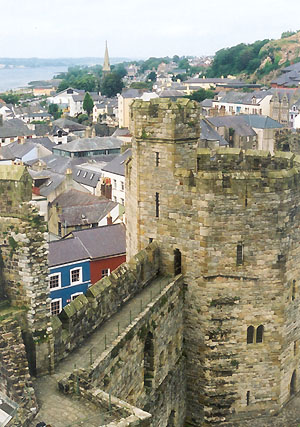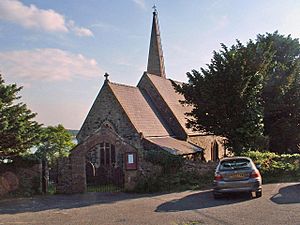Welsh toponymy facts for kids

The names of places in Wales mostly come from the Welsh language. But they have also been shaped by other languages over time. These include words from the Romans, Anglo-Saxons, Vikings, Anglo-Normans, and modern English. Studying these names helps us understand Wales's history, geography, and how the Welsh language grew. The Welsh Place-Name Society helps people learn about these names.
Contents
A Look Back at Welsh History
Wales became a special place between the 4th and 11th centuries. While other parts of Britain were settled by Anglo-Saxons, Wales developed its own language, culture, and laws. From the 11th to the 16th centuries, Wales slowly became part of the Kingdom of England. However, it kept many of its unique cultural features, especially its language.
Over time, Welsh and English cultures mixed. English became important for business, but Welsh stayed alive, especially in areas like northwest, mid, and west Wales. This area is known as y Fro Gymraeg, meaning "Welsh language country." Since the mid-19th century, Welsh culture and its right to govern itself have become stronger.
How the Welsh Language Works
The Welsh language is a Western Brittonic language. It comes from an older language called Common Brittonic, which was spoken all over Britain before the Anglo-Saxon and Viking invasions. Many place names in Britain, especially for natural spots like rivers and hills, come directly from Common Brittonic.
For example, Penrith means "headland by the ford." And many rivers are called Avon, which comes from the Welsh word afon meaning "river."
Welsh is still a living language, spoken by more than 20% of people in Wales today. Like all languages, it changes over time. It has borrowed words from other languages, such as Latin and English.
One interesting thing about Welsh is its "mutations." These are changes to the first letter of a word depending on how it's used in a sentence. For example, a church (llan) named after Saint Mary (Mair) becomes Llanfair. The 'm' in Mair changes to an 'f' (which sounds like 'v') for grammar reasons.
Welsh and English also spell words differently. In Welsh, a single 'f' sounds like 'v', while 'ff' sounds like 'f'. So, afon (river) is pronounced with a 'v' sound. That's why it's often spelled "Avon" in English place names.
How Place Names Grew in Wales
Long ago, people in Wales first named natural places like rivers, hills, and coasts. Before the Romans arrived, there weren't many organized towns, so there wasn't much need to name them.
Roman towns were usually forts. They were called castra, which became caer in Welsh. Caer originally meant "fortified enclosure." Many of these places stayed towns after the Romans left. Examples include Caernarfon, Carmarthen (Caerfyrddin), Caerleon, and Caerwent.
Many villages and towns later got their names from natural features. For instance, Abergele means "mouth of the [river] Gele." Harlech means "fair rock," and Porthcawl means "harbour with sea-kale." Aberystwyth means "mouth of the Ystwyth," a river about a mile from the town.
Other places got their names from religious settlements and monasteries, which started in the fifth century. These often use the word llan, which means "parish" or "church." Most of them are named after their founders, who were local saints. Examples include Llandudno ("Saint Tudno's"), Llanelli ("Saint Elli's"), and Llantwit ("Illtud's").
The Industrial Revolution led to many new towns and villages, especially in south Wales. Some kept old names, while others got new ones. For example, Port Talbot and Tredegar were named after the rich landowners who developed them. In north Wales, Porthmadog was named by its developer, William Madocks, after himself and a legendary sailor named Madoc.
A famous example of a long name is Llanfairpwllgwyngyll. In the 1860s, this village added even more words to its name to make it super long. This was a clever trick to keep its railway station open! Its full name means "St Mary's church beside the hollow with white hazels."
Here are some common Welsh words you'll find in place names:
| Welsh | English Meaning |
|---|---|
| aber | where two rivers meet, or a river flows into the sea |
| afon | river |
| allt | hillside, wood |
| bach | little |
| bryn | hill |
| bwlch | gap in hills, pass |
| caer | fort, stronghold |
| capel | chapel |
| castell | castle |
| coed | forest, wood |
| craig | rock |
| cwm | valley |
| din | hill fort |
| dinas | city |
| dol | meadow |
| dŵr | water |
| dyffryn | valley |
| eglwys | church |
| ffordd | road |
| ffynnon | spring |
| glan | river bank, shore |
| glyn | deep valley |
| llan | parish, church |
| llyn | lake |
| mawr | big |
| melin | mill |
| moel | bare hill |
| môr | sea |
| mynydd | mountain, moorland |
| nant | brook, small valley |
| newydd | new |
| pen | head, end |
| pentre | village |
| pont | bridge |
| porth | harbour, gateway |
| pwll | pool |
| rhyd | ford (a shallow place to cross a river) |
| traeth | beach |
| tref | village, town |
| tŷ | house |
| ynys | island, river-meadow |
Welsh and English Place Names: Similarities and Differences
Most of the time, the Welsh and English names for a place in Wales are the same. This is usually because the Welsh name is used. For example, Aberystwyth, Blaenau Ffestiniog, Bangor, and Llandudno are spelled the same in both languages. However, English speakers might pronounce them differently.
Many names are very similar in spelling and sound, like Caerphilly (Caerffili) and Merthyr Tydfil (Merthyr Tudful). Often, English speakers adopted and changed the Welsh name slightly. But sometimes, especially near the English border, the Welsh adopted the English name. Examples include Flint (Y Fflint) and Wrexham (Wrecsam).
Sometimes, the spelling used in English has changed to match the Welsh spelling. For instance, Caernarfon used to be spelled "Carnarvon" in English. Conwy was "Conway," and Llanelli was "Llanelly." These changes usually happened in areas where Welsh is spoken a lot.
In some cases, Welsh and English names come from the same original word but have changed differently over time. Cardiff (Caerdydd) is a good example. The old Welsh name was Caerdyf. From this came the English "Cardiff" and the modern Welsh "Caerdydd."
Finally, some places have very different Welsh and English names. This can happen for many reasons. Brecon and Cardigan got their English names from old kingdoms, but their Welsh names came from local rivers. Names given by Norse (Viking) settlers, like Swansea and Fishguard, were often used in English but not by the Welsh.
Here are some places in Wales where the Welsh and English names are quite different:
| English Name | Welsh Name | What They Mean |
|---|---|---|
| Anglesey | Ynys Môn | English name means "Ongull's island" (from Norse). Welsh name is very old, possibly linked to the Roman name Mona. |
| Blackwood | Coed-duon | Both names mean "black woodland." |
| Brecon | Aberhonddu | English name from an old kingdom. Welsh name from the River Honddu. |
| Bridgend | Pen-y-bont (ar Ogwr) | Both names mean "end of the bridge." |
| Cardigan | Aberteifi | English name from an old kingdom. Welsh name from the River Teifi. |
| Chepstow | Cas-gwent | English name means "place with market." Welsh name means "castle of Gwent." |
| Fishguard | Abergwaun | English name means "fish yard" (from Norse). Welsh name from the River Gwaun. |
| Holyhead | Caergybi | English name means "holy headland." Welsh name means "St. Cybi's fort." |
| Menai Bridge | Porthaethwy | English name came after the bridge opened. Welsh name means "ferry of Daethwy people." |
| Milford (Haven) | Aberdaugleddau | English name means "sandy inlet" (from Norse). Welsh name from the Daugleddau estuary (two Cleddau rivers). |
| Mold | Yr Wyddgrug | English name from Norman French "high hill." Welsh name means "the mound with burial cairn." |
| Monmouth | Trefynwy | Both names come from the local river Mynwy or Monnow. English means "mouth of the Monnow." Welsh means "town on the Mynwy." |
| Montgomery | Trefaldwyn | English name from a Norman lord. Welsh name means "Baldwin's town." |
| Newport | Casnewydd | English name means "new borough." Welsh name means "new castle." |
| Snowdon | Yr Wyddfa | English name means "snowy hill." Welsh name means "the burial mound." |
| Swansea | Abertawe | English name means "Sveyn's island" (from Norse). Welsh name from the local river Tawe. |
| Usk | Brynbuga | English name from the River Usk. Welsh name means "Buga's hill." |
| Welshpool | Y Trallwng | Both names mean "boggy area." English added "Welsh" to tell it apart from another town called Poole. |
Rules for Place Names in Wales
Deciding how to name places in Wales can sometimes be tricky. People might disagree on whether to use both Welsh and English names, or just one, and which one should come first. Also, names and spellings change over time.
The Welsh Government and the Ordnance Survey (who make maps) have rules for standardizing place names. They get advice from the Welsh Language Commissioner and experts at the University of Wales, Bangor.
For road signs, the Welsh Government says that signs on motorways and main roads will be bilingual (in both languages). If a sign is only in English now, it will become bilingual when it's replaced. The order of the languages on the sign depends on the local area. In Welsh-speaking areas, Welsh usually comes first. In other areas, English usually comes first.
Road signs also show Welsh names for places in England. For example, new signs in south Wales show Llundain (London) and Bryste (Bristol) alongside their English names.
Welsh Names for Places Outside Wales
The Welsh language has names for many towns and places across Britain and Ireland. Some of these come from very old Brythonic names used before the Romans arrived. Examples include Llundain (London), Cernyw (Cornwall), and Dyfnaint (Devon).
Many English towns that were Roman forts and now end in "-c(h)ester" also have Welsh names. These often start with Caer-. For example, Caer or Caerlleon for Chester, Caerloyw for Gloucester, and Caerwrangon for Worcester.
Sometimes, Welsh names are translations of the English name. For example, Rhydychen (meaning "oxen ford") is the Welsh name for Oxford. Gwlad-yr-haf ("land of summer") is the Welsh name for Somerset.
Welsh people have also given Welsh names to newer English cities where they had strong connections, like through trade. Examples are Bryste (Bristol) and Lerpwl (Liverpool).
Finally, some Welsh place names are for towns in England close to the Welsh border. For some, like Ross-on-Wye (Rhosan-ar-Wy), the English name seems to have come from the Welsh. For others, like Ludlow (Llwydlo) and Hereford (Henffordd), the Welsh name came from the English. The Welsh name for Shrewsbury, Yr Amwythig, means "the fort in scrubland."
Images for kids
-
The castle at Caernarfon (meaning in Welsh "the fortress in Arfon"), which was formerly anglicised as "Carnarvon" or "Caernarvon". The name "Arfon" refers to the area "opposite Môn" or Anglesey.
-
St. Mary's Church (Llanfair) gave its name to the village of Llanfairpwllgwyngyll in Anglesey




